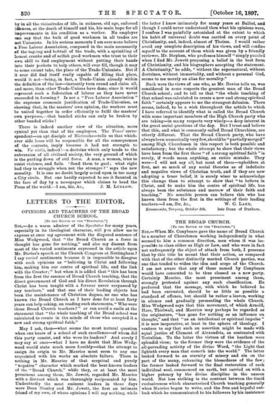LETTERS TO THE EDITOR.
OPINIONS AND TEACHERS OF THE BROAD CHURCH SCHOOL.
[TO THE EDITOR OF THE "SPECTATOR."]
Sin,—As a warm admirer of the Spectator for many years, especially in its theological character, will yau allow me to express at once my agreement with the disputed sentence of Miss Wedgwood, that "the Broad Church as a force in thought has gone for nothing," and also my dissent from most of the varied sentiments expressed in the article upon Mr. Davies's speech at the Church Congress at Nottingham P I say varied sentiments because it is impossible to disagree with such opinions as "believing in Christ and following him, making him our centre of spiritual life, and the link with the Creator ; " but when it is added that "this has been from the first the essence of Broad Church teaching, that the direct government of God and his direct Revelation through Christ has been taught with a fervour never surpassed by any teachers," and that one of their leading objects has been the maintenance of Christian dogma, no one who has known the Broad Church as I have done for at least forty years can help asking, on reading such statements," Who were those Broad Church teachers ? " or can avoid a smile at the statement that "the whole teaching of the Broad school was calculated to create in the minds of those who aocepted it a new and strong spiritual faith."
May I ask, then—what seems the most natural question when one hears of a school of such excellence—of whom did this party consist, and who were its leaders ? And surely I may say at once—what I have no doubt that Miss Wedg- wood would state much more forcibly—that the attempt to assign .its origin to Mr. Maurice must seem to any one acquainted with his works an absolute failure. There is nothing in Mr. Maurice of that sceptical and purely "negative" character which marked the best-known leaders of the "Broad Church," while they, or at least the most prominent among them, Mr. Jowett, regarded Mr. Maurice with a distrust which was thoroughly reciprocated by him. Undoubtedly the most eminent leaders in those days were Dean Stanley and Mr. Jowett, the first an intimate friend of my own, of whose opinions I will say nothing, while
the latter I knew intimately for many years at Balliol, and though I could never understand then what his opinions were, I confess I was painfully astonished at the extent to which his habit of universal doubt was carried on every point of Christianity, and, indeed, almost of Theism. I would rather avoid any complete description of his views, and will confine- myself to the account of them which was given by a friendly reviewer, Mr. Stephen, who professes himself "simply puzzled when I find Mr. Jowett proposing a belief in the best form of Christianity, and his biographers accepting the statement. A Christianity," he wide, "without the supernatural, without doctrines, without immortality, and without a personal God, seems to me merely an alias for morality."
Such were the views of one who, as Mr. Davies tells us, was considered in some respects the greatest man of the Broad Church school; and to tell us that "the whole teaching of that school was calculated to create a new and strong spiritual faith" certainly appears to me the strangest delusion. There seems, indeed, to be a wish throughout the article to which I have referred to identify what is called the Broad Church with some important members of the High Church party who are taking—in many respects very wisely—a deep interest in the great social questions of the day. But I trust and believe that this, and what is commonly called Broad Churchism, are utterly different. That the Broad Church party, who have always been numerically very few, should be " partially merged" among High Churchmen in this respect is both possible and satisfactory; but the whole attempt to show that their views have been from the first those "of a strong spiritual faith "is surely, if words mean anything, an entire mistake. They were—I will not say all, but most of them—upholders at first, not so much of any social theories as of indefinite and negative views of Christian truth, and if they are now adopting a truer belief, it is surely wiser to acknowledge this change than to attempt to show that "to believe in Christ, and to make him the centre of spiritual life, has always been the substance and marrow of their faith and teaching." No sensible person can believe this who has known them from the first in the writings of their leading Kanescombe, Torquay, October 5th. late Dean of Durham.






































 Previous page
Previous page